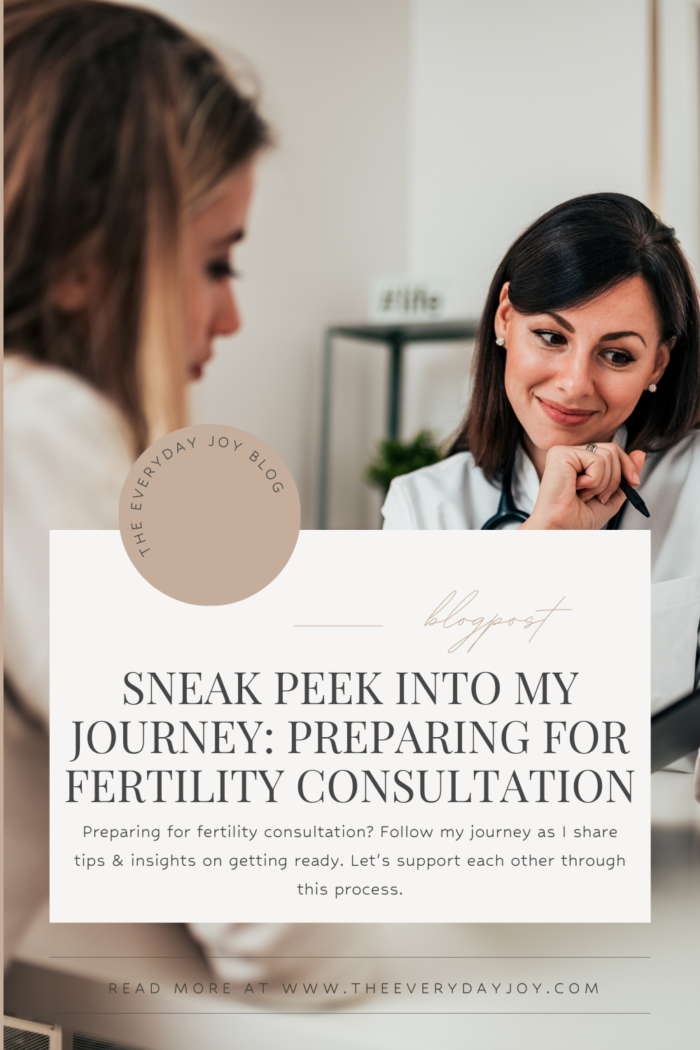Sneak Peek into My Journey: Preparing for Fertility Consultation

Hi everyone, I’m finally taking a huge step in my fertility journey—I’m going to see a fertility specialist! After 4 ½ years of struggling with infertility, I’m feeling a mix of excitement and nerves. This decision has been a long time coming, and it’s taken a lot to get here. Let me share a bit of my story and how I’m preparing for this big step.
Initially, I planned to see a specialist after 1 ½ years of trying, but I ended up canceling that appointment. There were a couple of reasons for this. First and foremost, seeing a fertility specialist can be very expensive, and we didn’t have the finances at that time. Instead of pursuing fertility treatments, we decided to pursue adoption, which had always been on my heart and felt like God was leading us in that direction. We wanted to focus entirely on the adoption process, preparing our hearts to bring a child into our family through adoption, so we put fertility testing on hold.
Additionally, I hesitated because of a terrible experience with a doctor at a women’s health clinic. He was dismissive and rude, telling me to wait until it had been three years and suggesting I try holding my legs up after intercourse—advice with no medical backing! It was so unprofessional and rude! How he was a medical doctor, I have no idea! I left his office in tears and disbelief, and it’s taken all this time to muster the courage to focus on my reproductive health again.
Now, I feel ready to jump back into figuring out what is going on with my reproductive health. My son just turned a year old, and I would love to give him some siblings. I am also now in a place in my life where I am more financially able to pursue this. I feel more sure of myself and confident that I can stand up for myself if I have a repeat of the previous doctor situation. Honestly, I feel ready, and I have a lot of peace about it. So, here is how I am preparing for fertility consultation:
Destressing My Personal Life
Fertility testing and treatments can be incredibly stressful, filled with uncertainty, and emotional ups and downs. Given my past experiences, it’s been crucial for me to work on destressing my life. I’ve found that setting up routines like meal and nap times and taking the dogs out for a walk helps make my day more predictable and smooth. Incorporating self-care into my daily routine, even in small ways, has made a significant difference. It helps me to slow down, check on how I am feeling, and take a quick breather before I’m back to fully engaging with my family.
I’ve been taking time to do my nails, even if it’s just sticking on nails quickly in the car. After a shower, I love to relax with a face mask, even if it’s after my son has gone to sleep. I also enjoy listening to audiobooks whenever I can squeeze in the time.
Why is destressing important? Stress can negatively affect your overall health and well-being, which is critical when you’re starting fertility treatments. A calmer, more relaxed state of mind can help your body be more receptive to treatment.
Tips for Destressing:
- Establish a daily routine that includes moments of self-care.
- Find activities that help you relax, such as reading, listening to music, or taking a walk.
- Make time for hobbies you enjoy, even if it’s just for a few minutes each day.

Eating Balanced Meals
I’m also focusing on eating balanced meals to improve my chances of conceiving with whatever protocol the specialist recommends. While I haven’t been following any strict diets, I’ve been mindful of incorporating high protein, healthy fats, and complex carbs into my meals. By particularly focusing on adding more protein, I’ve noticed a significant reduction in my sugar cravings, which has helped me maintain better overall nutrition.
My day typically starts with a cup of coffee (with creamer because it brings me joy). For example, my meals typically include yogurt or eggs for breakfast, a salad with protein or a sandwich with raw veggies for lunch, and a balanced dinner with protein, carbs, and veggies. I really enjoy getting seasonal produce from the farmer’s market to color my plate.
Why is eating balanced meals important? Proper nutrition supports your body’s overall health and can improve fertility. Balanced meals provide essential nutrients that can enhance reproductive health and prepare your body for potential treatments.
Tips for Eating Balanced Meals:
- Plan your meals ahead to ensure they are balanced and nutritious.
- Include a variety of proteins, healthy fats, and complex carbs in your diet.
- Treat yourself occasionally to foods you love to keep your diet enjoyable.
Exercising Regularly
Living in an apartment with a baby and two large dogs means I get plenty of exercise. Carrying my son up and down the stairs, walking the dogs, and handling daily chores not only keep me active but also significantly contribute to my overall fitness. These daily activities ensure I get a full-body workout, which is essential for my health and well-being. Carrying my son, who is starting to walk, especially on our many trips up and down the stairs, combined with frequent walks with the dogs, gives me a comprehensive workout each day.
Everything from taking the trash out to grocery shopping becomes a workout when you’re carrying a baby. I aim for at least 30 minutes of exercise a day, which is more than achievable with my current routine.
Why is exercise important? Regular physical activity can improve your overall health and increase your chances of conceiving. Exercise helps regulate your hormones and improve your mood, both of which are beneficial when starting fertility treatments.
Tips for Exercising Regularly:
- Incorporate physical activities into your daily routine, such as walking or taking the stairs.
- Find exercises you enjoy, which can include playing with your children or pets.
- Aim for at least 30 minutes of physical activity each day.

Preparing Mentally
Given the many uncertainties that come with infertility, I’m setting realistic expectations and learning how to better advocate for myself, especially after that awful experience with the previous doctor. This time, I’m approaching the journey with hesitant hope, focusing on forming a plan with the specialist and staying mentally prepared for the emotional ups and downs that might come.
Why is preparing yourself mentally important? Mental preparation helps manage stress and keeps you resilient through the ups and downs of fertility treatments. A positive and realistic mindset can make the journey more manageable.
Tips for Preparing Mentally:
- Set realistic expectations for your fertility journey.
- Practice self-advocacy and ensure you feel empowered to communicate your needs.
- Engage in activities that boost your mental well-being, such as meditation or journaling.
Educating Myself
Knowledge is power, especially when it comes to infertility and its treatments. By educating myself about different fertility treatments, their success rates, risks, and benefits helps me feel more in control and less anxious. This understanding significantly reduces uncertainty and empowers me to make informed decisions about my health.
Why is educating yourself important? Being informed allows you to make better decisions about your health and treatments. It helps you feel more empowered and less anxious, knowing what to expect.
Tips for Educating Yourself:
- Research different fertility treatments and their success rates.
- Prepare a list of questions to ask your specialist during appointments.
- Stay updated with reliable sources of information on reproductive health.
Financial Planning
With the sale of our house, we’ve been able to save specifically for fertility testing and treatments. Additionally, I’ve reviewed our insurance policy to understand what fertility treatments are covered and considered additional savings plans if needed. This financial preparation provides peace of mind, allowing me to focus more on the treatment process itself rather than the financial burden.
Why is financial planning important? Fertility treatments can be expensive, and having a financial plan in place can alleviate some of the stress. Knowing you have the resources to cover your treatments allows you to focus more on the process itself rather than the financial burden.
Tips for Financial Planning:
- Review your insurance policy to see what fertility treatments are covered.
- Set aside savings specifically for fertility treatments.
- Explore additional insurance options or financial assistance programs.
I’m excited and nervous about this next step, but I’m hopeful that with proper preparation, I can approach this journey with confidence. Thank you for being a part of my story, and I hope my experiences can help others who are on a similar path. If you’re preparing to see a fertility specialist, remember to take care of yourself in all aspects—emotionally, physically, and mentally.
If you are also going through this journey of infertility and need extra encouragement, I’ve created a free 8 day devotional titled “Blossoming in the Waiting“. This devotional is specifically designed to uplift and inspire those facing infertility. It provides daily reflections and encouraging scriptures to help you find peace, strength, and purpose in your journey.
We’re in this together! I invite you to share your own experiences or thoughts in the comments below. Remember, seeking support from loved ones or online communities can make all the difference. As you embark on your fertility journey, take time to reflect on your own self-care practices and preparation strategies. Together, we can navigate this journey with strength and resilience.

Reflecting on your own journey, what steps have you taken to prepare yourself mentally, physically, and emotionally for fertility consultation or treatment?




